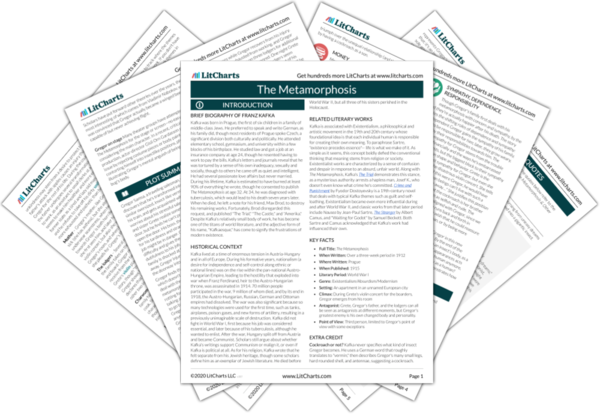Mind vs. Body
When Gregor first wakes up as a cockroach, he's more concerned about how his transformation will affect his ability to carry out his duties than the actual physical fact of having turned into a repulsive insect. At first, it seems as though Kafka is making a funny, absurdist allegory about the disconnect between the way we perceive ourselves and the way others perceive us. This is true on some level, but the mind vs. body…
read analysis of Mind vs. BodyFamily
After Gregor's transformation, he becomes entirely reliant on his family, in the way that they, before his transformation, relied on his wages. His feelings of duty and responsibility toward his family concern him much more than his bizarre physical predicament. Yet his sister Grete, mother, and father are unable to think of him or treat him in the same way as before. Much of their change in attitude is due to their…
read analysis of FamilyMoney
Money (more accurately, the lack of it) hangs over the story, forming the major pressure on the family. Gregor, once transformed, can no longer be his family's income source, which makes his transformation more difficult for his family to bear. He also blocks his family from making income from taking on boarders when he creeps up on the boarders during Grete's concert. Part of the story's humor comes from the fact that the…
read analysis of Money
Intentions vs. Outcomes
Gregor always has the best intentions, but he fails to communicate them effectively, and always makes blunders that increase his family's difficulties. The most heart-wrenching example of a well-intentioned, failed gesture comes during Grete's violin concert for the boarders. Gregor wants to prove that he's not a mere animal, and feels that the music will offer him the "unknown nourishment" he's lacking (which suggests that a lack of art and beauty contribute to…
read analysis of Intentions vs. OutcomesSympathy, Dependence, Responsibility
Though Gregor's family first deals with his metamorphosis with concern and sympathy, by the story's end they're actually happier after his death. The story demonstrates the shifting roles of dependence and sympathy: at first, the dependent Gregor gains the sympathy of his family, who attempt to be responsible for him; later, they grow weary, even angered, by their responsibilities towards him. The family's loss of sympathy for Gregor stems from the trouble he's caused…
read analysis of Sympathy, Dependence, Responsibility






